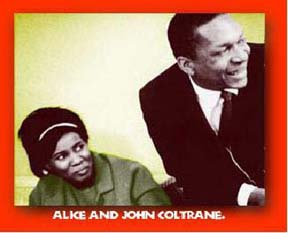

Jazz harpist, pianist, organist, composer, arranger, Alice Coltrane, was heavily influenced by Hinduism. Her music reflects not only the influence of her former husband, jazz great John Coltrane, but also her fascination with this Indian religion. |
A Love Supreme: Ian's Guide to the Ecstatic Spirit in Jazz
LISTEN TO SOME OF ALICE'S MUSIC
EXAMPLES OF SONGS THAT HAVE HINDU INFLUENCE
Mantra: Listen carefully and you can hear the tambourine used at puja in the background.Journey in Satchindananda: The sitar, drums, and saxophones are used in this piece.
Shiva-Loka: The name of this song itself is Hindu. Shiva, also known as the destroyer is the name of a Hindu God. This piece uses the sitar and sounds very similar to classical Indian music.
Stopover Bombay: This song is very lively and uses the piano, tambourine, and saxophone. It sounds like a Hindu puja is going on in the background.
She was a devotee of Swami Satchidananda, and eventually adopted the Hindu name of Turiya. In 1975 she formed the Vedanta Center in California as a center for her spiritual activities. In her spiritual life she is now a devotee of the living Hindu saint Satya Sai Baba, and goes by the name Swamini Turiyasangitananda. In the 1980s and 1990s she made a number of recordings of devotional music that are not very widely distributed, but are now listed here.
Radio Show - WABQ in Cleveland, OH
August 5, 1990 3:40 am
On the Path to Devotion
Alice Coltrane also known as Swamini Turiyasangitananda, and Swami Krishnapad talk about their ashram and what they believe in. Alice Coltrane formed the Vedanta Center in California. When asked what the organization is doing to help the problem of segregation of children and parents, Alice Coltrane said her ashram focuses on teaching the importance of family unity. She believes that family should be a unit and families should consider themselves one whole. Parents should be an example for their children.Swami Krishnapad was asked if he believed in Jesus. He said YES; God comes in different forms. There are many great teachers and Jesus was one. His teachings are of the father who sent him. We all have same father, Jesus is a Son of God and he came to help us be proper sons. He taught us how to be in harmony with the father. God is love and those who live in God, live in love. He says that he appreciates that Jesus has come because he has helped mankind serve God. God is not for one particular religious group. The kingdom of God is one.
When asked how Alice Coltrane feels about Jesus she said the following: Jesus was an avatar and incarnation of God. He was a prophet of God, but NOT God. He knew that he was the Son of God. All persons can one day rise to the status of Christ and also be prophets.
The radio personality asked why God has many names and what does Krishna mean. Swami Krishnapad responded by saying God has many names but there is only one God. The name Krishna emphasizes knowledge, pleasure, and happiness. He continued by saying that when people practice sense gratification, they are performing idol worship. One should not worship idols. Alice has shown us that you can renounce sense gratification and material goods and uplift to consciousness
For more information about this interview contact:
Institute of Spiritual Technology
PO Box 76451
Capitol Hill, Washington DC
20013

John Coltrane was heavily influenced by drugs and alcohol in the late 1950's and Eastern religions in the early 1960's. In 1956, Miles Davis fired him from the group due to Coltrane's substance abuse problem. At that point John Coltrane had a "spiritual awakening" and stopped drinking and doing drugs. Fortunately for Coltrane, Miles Davis hired him back in 1957. |
A Love Supreme: Ian's Guide to the Ecstatic Spirit in Jazz
The
Development of John Coltrane's Concept of
Spirituality
and Its Expression in Music
LISTEN TO SOME OF JOHN'S MUSIC
The Major Works of John Coltrane: OM
Please send comments or questions to Uttara
Mehta

![]()